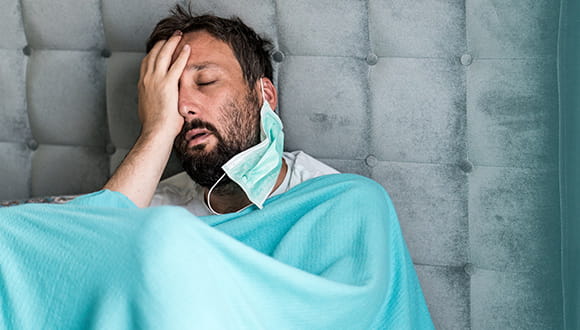(This article was updated on 11/8/2021)
Fighting an infection is hard work. Just ask your immune system.
And your immune system isn't just powerful — it's smart. It remembers things, and this memory is what allows it to better protect you from a harmful invader you've already seen before. This memory is the foundation of immunity.
If you've had COVID-19, you can be sure your immune system was working overtime to clear the infection.
But what do we know about immunity to COVID-19 after someone has recovered? Is it real? How long does it last? Put more simply, can you catch COVID-19 a second time?
What we know (and don't know) about natural immunity to COVID-19
In terms of the immunity that's built during infection (aka natural immunity), studies show that the vast majority of individuals who've recovered from COVID-19 produce all of the major components that facilitate immunity — including protective antibodies and trained immune cells.
"For instance, a recent study showed that 98% of recently recovered individuals produce antibodies against the spike protein found on the shell of this virus. The study also showed that the levels of these antibodies seems to decline only a very little over the course of six to eight months," explains Dr. Hiram Martinez, primary care physician at Houston Methodist.
While rare, reinfection with COVID-19 is possible
Immunity isn't universal, and it's certainly not simple. Case reports and studies also show that reinfection with COVID-19 is possible — albeit rare.
"Another recent study found that not only can a person get COVID-19 a second time, reinfected individuals can carry significant amounts of the virus without showing any symptoms — raising concern about inadvertent transmission of the virus during reinfection," warns Dr. Martinez.
The specifics of being immune to COVID-19 likely vary by person, how severe the infection was and a variety of other factors. And while COVID-19 antibody testing is available, the results can only help you understand whether you might have been infected in the past — not how robust your natural immunity might be or how protected you are from reinfection.
"The biggest issue with natural immunity is that there's no easy way to assess it at the individual level out in the community. We don't have a way to say, 'Your natural immunity should protect you for about eight months' to one person, and then say, 'Your natural immunity will only protect you for a few months' to the next," adds Dr. Martinez.
For this reason, Dr. Martinez urges people to continue to stay vigilant and practice the protective behaviors that help keep yourself and everyone else safe — even if you've already had COVID-19. He also recommends anyone who's eligible for the COVID-19 vaccine to get vaccinated.
Yes, you should still get vaccinated even if you've already had COVID-19
One of the most common questions Dr. Martinez is getting asked right now is whether vaccination is important for people who've had COVID-19.
"At this point, there are just too many unknowns regarding how durable and reliable natural immunity is to feel confident about the protection it may offer. What we can feel more confident about is the vaccine-induced immunity provided by COVID-19 vaccines," explains Dr. Martinez.
In fact, a recent study found that unvaccinated adults were twice as likely to get reinfected with COVID-19 than those who got vaccinated after they'd recovered from their illness.
By mimicking infection, vaccines help build immunity in a safer way, inducing an immunity that is potentially stronger and longer-lasting than natural immunity.
"We know that the COVID-19 vaccines provide strong protection from this devastating virus, and while we don't know exactly how long this protection will last, the durability of vaccine-induced immunity will continue to be very closely studied in the ongoing COVID-19 vaccine clinical trials," says Dr. Martinez.
Importantly, it's unclear how effective natural immunity might be against the COVID-19 variants currently circulating.
"Experts are already looking at how effective the COVID-19 vaccines are against these variants. So far, it seems that vaccine efficacy is not dramatically reduced for the most prominent variants. We cannot say the same for natural immunity at this point," adds Dr. Martinez.
The bottom line: Even if you've already had COVID-19, reinfection is possible. This means you should continue to wear a mask, practice social distancing and avoid crowds. It also means you should get vaccinated as soon as the COVID-19 is made available to you. (Related: How Soon Can You Get Vaccinated After Recovering From COVID-19?)
Sign up for your COVID-19 vaccine:
All individuals age 5 and older are currently eligible to receive a Pfizer COVID-19 vaccine in Texas.


